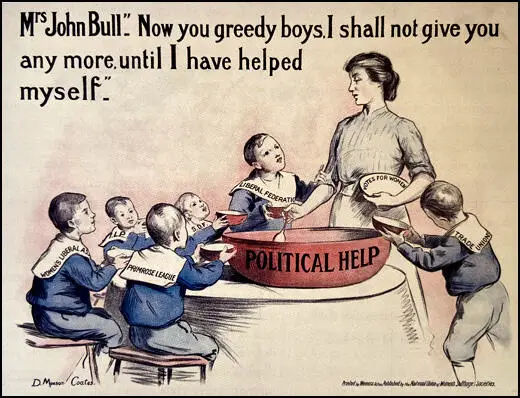On this day on 29th October
On this day in 1618 Walter Raleigh died. Henry Howard, youngest brother of Thomas Howard, 4th Duke of Norfolk, wrote to King James questioning the loyalty of Walter Raleigh after the death of Queen Elizabeth. Howard described Raleigh as "an atheist, indiscreet, incompetent, hostile to the very idea of James's succession". It is believed that Howard wrote these letters on behalf of Robert Cecil, who saw Raleigh as a potential rival for the important post of chief government minister.
Walter Raleigh was stripped of his monopolies and captaincy of the guard in May, and was given notice to quit Durham Place, Tobias Matthew, bishop of Durham, having successfully petitioned James for the return of his London home. On 15th July, Raleigh was detained for questioning in connection with a plot to put Arabella Stewart on the throne. He was imprisoned in the Tower of London and on 27th July he tried to stab himself to the heart using a table knife.
Raleigh was tried in November 1603. As a result of an outbreak of plague in London it was decided to hold the trial in the Great Hall of Winchester Castle. (79) According to one source "when Raleigh was escorted from the Tower by a guard of fifty horse, it was touch and go whether he would make it out of the city alive, for the mob was determined to see the disdainful courtier dashed to the ground."
The main evidence against him was the signed confession of Henry Brooke, 11th Baron of Cobham. However, Brooke, withdrew his accusations almost as soon as they were made. Raleigh argued: "Let my accuser come face to face, and be deposed". However, the jury was not told about this and Brooke was not allowed to testify and be cross-examined.
Walter Raleigh was found guilty of treason and sentenced to be hung, drawn and dismembered. However, King James granted him a last-minute reprieve and was ordered to spend the rest of his life confined to the Tower of London. Raleigh was also stripped of all his titles. His letters reveal the depths of his depression and hopelessness during this period. Eventually, he decided to spend his time studying history and science.
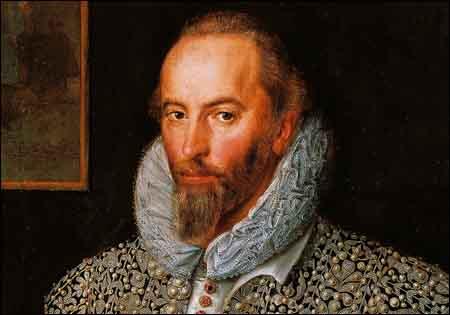
On this day in 1872 Marion Phillips, the youngest in the family of three sons and four daughters of Phillip David Phillips (1836–1909), an Australian-born Jewish lawyer, and his wife, Rose Asher, was born, at St Kilda, near Melbourne in Australia. She was educated at home, at the Melbourne Presbyterian Ladies' College (1897–8), and then at Ormond College, part of Melbourne University, where she studied philosophy and history.
In 1904 she went to England to study at the London School of Economics (LSE). Her tutor, Graham Wallas, introduced her to Sidney Webb and Beatrice Webb. This resulted in her being employed as a research assistant into their investigation into public health, poor-law medical relief, and the treatment of destitute children. During this period she became a member of the Fabian Society, the Independent Labour Party and the National Union of Women's Suffrage Societie. In 1909 she decided to move into the Holland Park house of a fellow researcher, Dr Ethel Bentham.
Ella Winter, knew Phillips when she lived as a child in Australia. "We all admired her extravagantly - her brilliant mind and effectiveness as a speaker, her activities as suffragist, pacifist, labour organizer... It was a red-letter day for us all when Marion came. She was striking-looking, with black hair, small hands and feet, intense brown eyes - and a stout, uncorseted, ungainly body, which one forgot in the acute discussions she always brought into being. I sat on a hassock, ears and eyes glued to her, drinking in what she said about events, political personalities - she knew everyone - and policies. She made public questions so alive and fascinating that I am sure politics must fill my world; Marion lived as I wanted to live, I would pattern my career on hers. I would not need to marry, any more than she had. My life, like hers, would be in my work."
Phillips graduated DSc (Econ) with a doctoral thesis on the development of New South Wales. This was published in 1909 as "A Colonial Autocracy". In 1911 she became a lecturer at the LSE but the following year she became secretary of Women's Labour League. She also worked behind the scenes in order to develop closer links between the Fabian Society and the Labour Party.
In 1912 Phillips was elected a Labour councillor in the London borough of Kensington, where she pressed for public provision of baby clinics, school meals, improved council housing, employment schemes, and prohibition of sweated labour. As Natasha Lehrer has pointed out: "A prime motivation was the desire to see working class children being given both the protection and the opportunities that she herself had received during her happy middle-class childhood in Australia. She also fought for better medical inspection and treatment of school children."
During the First World War she was a member of the War Emergency Workers' National Committee, the Consumers' Council of the Ministry of Food, and the Central Committee on Women's Training and Employment. In 1918 she edited a volume of essays, Women and the Labour Party, which attempted to show "the contribution which the Labour Party has to make upon questions that are peculiarly the concern of women".
Phillips developed an abrasive personality. Katharine Bruce Glasier commented to Ramsay MacDonald that Phillips reminded her of Eleanor Marx in "her love of power and intrigue". She added "if only she could fall in love and mate and marry.... but just now she is as hard and cold as glass". Throughout her career Phillips was known for her powerful and abrasive manner. Beatrice Webb described her as "shrewd and capable but contentious" and in May 1918 referred to Phillips's "insolently critical attitude towards all persons and institutions" and her "sharp satirical tongue" made her "much disliked by the other leading women of the labour movement".
Her biographer, Brian Harrison, was more sympathetic and has argued: "Phillips, and many women like her, worked hard at the undramatic but necessary organizational tasks involved in creating a new political constituency, settling where necessary for the practical, but never losing sight of the ideal. She was particularly active in advancing women's interests on international bodies, and in pressing for improved working-class housing estates to include community centres with nurseries, communal kitchens, libraries, concert halls, and home-help services; all these she saw as not merely desirable in themselves but as essential to emancipate working-class housewives."
Phillips was extremely hostile to the Russian Revolution. In 1921 she became involved in a heated debate with the journalist, Lincoln Steffens, who had just returned from Russia. One of her former students, Ella Winter, later described the incident: "When the conversation turned to the Russian Revolution and Bolshevism, the evening, to my dismay, exploding into astonishing hostility and bitterness from Marion Phillips. Like the official Labour Party, she was implacably opposed to the Russian Revolution, but it did not occur to me that her enmity and personal rudeness may have been partly due to her realization that she was losing me."
Phillips upset some women activists by strongly opposing committing the Labour Party to promoting birth control in the 1920s. She was concerned that it would lose votes from the Roman Catholic working-class She told one of the campaigners, Dora Russell, "sex should not be dragged into politics" and the birth-control issue had the power to "split the party from top to bottom".
In the 1929 General Election Phillips was elected to represent the constituency of Sunderland. The Conservative Party won 8,664,000 votes, the Labour Party 8,360,000 and the Liberal Party 5,300,000. However, the bias of the system worked in Labour's favour, and in the House of Commons the party won 287 seats, the Conservatives 261 and the Liberals 59. Ramsay MacDonald became Prime Minister, but as before, he still had to rely on the support of the Liberals to hold onto power.
The election of the Labour Government coincided with an economic depression and MacDonald was faced with the problem of growing unemployment. In January 1929, 1,433,000 people were out of work, a year later it reached 1,533,000. By March 1930, the figure was 1,731,000. In June it reached 1,946,000 and by the end of the year it reached a staggering 2,725,000. That month MacDonald invited a group of economists, including John Maynard Keynes, J. A. Hobson, George Douglas Cole and Walter Layton, to discuss this problem. However, he rejected all those ideas that involved an increase in public spending.
In March 1931 Ramsay MacDonald asked Sir George May, to form a committee to look into Britain's economic problems. The committee included two members that had been nominated from the three main political parties. At the same time, John Maynard Keynes, the chairman of the Economic Advisory Council, published his report on the causes and remedies for the depression. This included an increase in public spending and by curtailing British investment overseas.
The Chancellor of the Exchequer, Philip Snowden, rejected these ideas and this was followed by the resignation of Charles Trevelyan, the Minister of Education. "For some time I have realised that I am very much out of sympathy with the general method of Government policy. In the present disastrous condition of trade it seems to me that the crisis requires big Socialist measures. We ought to be demonstrating to the country the alternatives to economy and protection. Our value as a Government today should be to make people realise that Socialism is that alternative."
When the May Committee produced its report in July, 1931, it forecast a huge budget deficit of £120 million and recommended that the government should reduce its expenditure by £97,000,000, including a £67,000,000 cut in unemployment benefits. The two Labour Party nominees on the committee, Arthur Pugh and Charles Latham, refused to endorse the report.
The cabinet decided to form a committee consisting of Ramsay MacDonald, Philip Snowden, Arthur Henderson, Jimmy Thomas and William Graham to consider the report. On 5th August, John Maynard Keynes wrote to MacDonald, describing the May Report as "the most foolish document I ever had the misfortune to read." He argued that the committee's recommendations clearly represented "an effort to make the existing deflation effective by bringing incomes down to the level of prices" and if adopted in isolation, they would result in "a most gross perversion of social justice". Keynes suggested that the best way to deal with the crisis was to leave the Gold Standard and devalue sterling. Two days later, Sir Ernest Harvey, the deputy governor of the Bank of England, wrote to Snowden to say that in the last four weeks the Bank had lost more than £60 million in gold and foreign exchange, in defending sterling. He added that there was almost no foreign exchange left.
Ramsay MacDonald went to see George V about the economic crisis on 23rd August. He warned the King that several Cabinet ministers were likely to resign if he tried to cut unemployment benefit. MacDonald wrote in his diary: "King most friendly and expressed thanks and confidence. I then reported situation and at end I told him that after tonight I might be of no further use, and should resign with the whole Cabinet.... He said that he believed I was the only person who could carry the country through."
According to Harold Nicolson, the King decided to consult the leaders of the Conservative and Liberal Parties. Herbert Samuel told the King that he should try and persuade MacDonald to make the necessary economies. Stanley Baldwin agreed and said he was willing to serve under MacDonald in a National Government.
After another Cabinet meeting where no agreement about how to deal with the economic crisis could be achieved, Ramsay MacDonald went to Buckingham Palace to resign. Sir Clive Wigram, the King's private secretary, later recalled that George V "impressed upon the Prime Minister that he was the only man to lead the country through the crisis and hoped that he would reconsider the situation." At a meeting with Stanley Baldwin, Neville Chamberlain and Herbert Samuel MacDonald told them that if he joined a National Government it "meant his death warrant". According to Chamberlain he said "he would be a ridiculous figure unable to command support and would bring odium on us as well as himself."
On 24th August 1931 Ramsay MacDonald returned to the palace and told the King that he had the Cabinet's resignation in his pocket. The King replied that he hoped that MacDonald "would help in the formation of a National Government." He added that by "remaining at his post, his position and reputation would be much more enhanced than if he surrendered the Government of the country at such a crisis." Eventually, he agreed to form a National Government. Marion Phillips, like most Labour Party MPs was appalled by what they considered to be MacDonald's act of treachery.
On 8th September 1931, the National Government's programme of £70 million economy programme was debated in the House of Commons. This included a £13 million cut in unemployment benefit. Tom Johnson, who wound up the debate for the Labour Party, declared that these policies were "not of a National Government but of a Wall Street Government". In the end the Government won by 309 votes to 249, but only 12 Labour M.P.s voted for the measures.
On 26th September, the Labour Party National Executive decided to expel all members of the National Government including Ramsay MacDonald, Philip Snowden, Jimmy Thomas and John Sankey. As David Marquand has pointed out: "In the circumstances, its decision was understandable, perhaps inevitable. The Labour movement had been built on the trade-union ethic of loyalty to majority decisions. MacDonald had defied that ethic; to many Labour activists, he was now a kind of political blackleg, who deserved to be treated accordingly."
The 1931 General Election was held on 27th October, 1931. MacDonald led an anti-Labour alliance made up of Conservatives and National Liberals. It was a disaster for the Labour Party with only 46 members winning their seats. Phillips was one of those who lost their seats.
Marion Phillips died from stomach cancer, on 23rd January 1932 at the Empire Nursing Home, Vincent Square, London; she was cremated at Golders Green on 27 January.
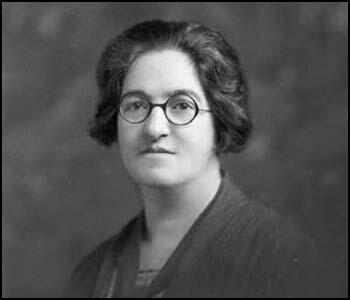
On this day in 1877 Nathan Forrest died. On the outbreak of the American Civil War Forrest enlisted in the Confederate Army as a private. An outstanding soldier, promotion was rapid and he organised the cover for the retreat at Shiloh. Forrest was badly wounded but after he recovered he conducted raids on the Union Army. Appointed a brigadier general by 21st July, 1862, he took part in Chickamauga. After a dispute with General Braxton Bragg he was transferred.
In April, 1864, Forrest and his men captured Fort Pillow in Jackson, Tennessee. The fort contained 262 African American and 295 white soldiers. It was afterwards claimed that most of these soldiers were killed after they surrendered. After the war an official investigation discovered evidence that "the Confederates were guilty of atrocities which included murdering most of the garrison after it surrendered, burying Negro soldiers alive, and setting fire to tents containing Federal wounded."
Forrest caused William Sherman serious problems during his Atlanta Campaign. Sherman was quoted as saying that Forrest had to be "hunted down and killed even if it costs 10,000 lives and bankrupts the Federal treasury." Forrest joined John B. Hood for the Nashville campaign and was still creating havoc when Robert E. Lee surrendered on 9th April, 1865. Joseph E. Johnston claimed that Forrest was the most impressive general of the American Civil War.
The first branch of the Ku Klux Klan was established in Pulaski, Tennessee, in May, 1866. A year later a general organization of local Klans was established in Nashville in April, 1867. Most of the leaders were former members of the Confederate Army and the first Grand Wizard was Nathan Forrest. During the next two years Klansmen wearing masks, white cardboard hats and draped in white sheets, tortured and killed black Americans and sympathetic whites. Immigrants, who they blamed for the election of Radical Republicans, were also targets of their hatred. Between 1868 and 1870 the Ku Klux Klan played an important role in restoring white rule in North Carolina, Tennessee and Georgia.
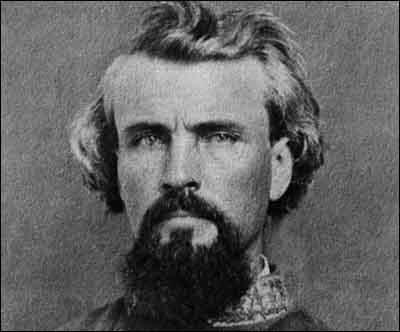
On this day in 1879 Franz von Papen was born. After the First World War Papen joined the Catholic Centre Party (BVP) and in 1921 was elected to the Reichstag. Two years later he purchased a controlling stake in its leading paper, the Germania. Papen immediately sacked the editor and over the next few years attempted to use the newspaper to impose his right-wing views on the party. This plan was unsuccessful and was considered as an outsider in the BVP.
As Papen had only a small political following it came as a great shock when Paul von Hindenburg decided to appoint Papen as chancellor on 31st May, 1932. Papen now decided to gain the support of the Nazi Party by lifting the ban on the Sturm Abteilung (SA) that had been introduced by Heinrich Brüning. This was followed by deposing the Social Democratic Party government in Prussia and aggressive statements about not keeping to the terms of the Versailles Treaty.
Papen's reactionary policies upset Kurt von Schleicher who favoured a coalition of the centre. When Schleicher managed to persuade several government ministers to turn against Papen he resigned from office. Papen now began to plot with Adolf Hitler in an effort to oust Schleicher who was now chancellor of Germany.
With the support of industrial leaders such as Hjalmar Schacht, Gustav Krupp, Alfried Krupp, Fritz Thyssen, Albert Voegler and Emile Kirdorf, Papen persuaded President Paul von Hindenburg to appoint Adolf Hitler as chancellor. Papen, who became vice-chancellor, told Hindenburg that he would be able to prevent Hitler from introducing his more extremist policies.
After the Night of the Long Knives, which included the murder of Kurt von Schleicher, Papen sent a letter to Hitler praising him for "crushing the intended second revolution." Soon afterwards Papen resigned as vice-chancellor and was sent as ambassador to Austria (1934-39) where he plotting successfully for the achievement of Anschluss. This was followed by the post of ambassador to Turkey (1939-44).
Papen retired to Westphalia where he was arrested by Allied forces on 10th April, 1945. He was charged with conspiring to start the Second World War at Nuremberg. He was found not guilty but the German government had him re-arrested and charged him with other offences committed while in Hitler's government.
On 1st May 1947 Papen was judged to be a "major offender" and sentenced to eight years imprisonment. However, like other wealthy supporters of the Nazi regime he was soon forgiven for his crimes and was released in January, 1949.
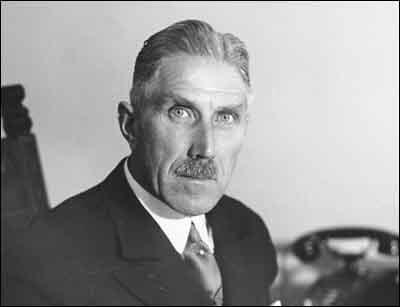
On this day in 1897 Henry George, philosopher and economist died. In 1870 George published Our Land and Land Policy. In the book he developed the philosophy and economic ideology known as Georgism. He argued that everyone owns what he or she creates, but that everything found in nature, most importantly land, belongs equally to all humanity.
Henry George followed this with Progress and Poverty (1877). In the book he tried to explain the growing gap between rich and poor. "The reason why, in spite of the increase of productive power wages constantly tend to a minimum which will give but a bare living, is that, with increase in productive power, rent tends to even greater increase, thus producing a constant tendency to the forcing down of wages."
George went on to argue: "It is true that wealth has been greatly increased, and that the average of comfort, leisure and refinement has been raised; but these gains are not general. In them the lowest class do not share. This association of poverty with progress is the great enigma of our times. There is a vague but general feeling of disappointment; an increased bitterness among the working classes; a widespread feeling of unrest and brooding revolution. The civilized world is trembling on the verge of a great movement. Either it must be a leap upward, which will open the way to advances yet undreamed of, or it must be a plunge downward which will carry us back toward barbarism."
In these two books George argued that the gap between the rich and the poor could only be closed by replacing the various taxes levied on labour and capital with a single tax on the value of property. Paul Thompson argues in his book, Socialist, Liberals and Labour (1967) that the book resulted in the growth in socialism: "The real socialist revival was set off by Henry George, the American land reformer, whose English campaign tour of 1882 seemed to kindle the smouldering unease with narrow radicalism. This radical voice from the Far West of America, a land of boundless promise, where, if anywhere, it might seem that freedom and material progress were secure possessions of honest labour, announced grinding poverty, the squalor of congested city life, unemployment, and utter helplessness."
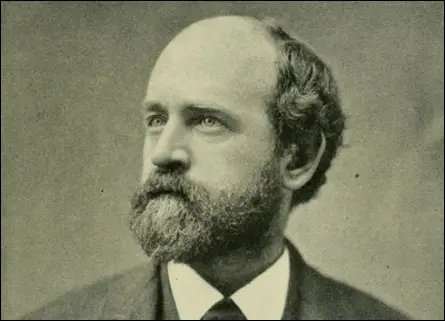
On this day in 1901 Leon Czolgosz, was executed. Czolgosz rejected his family's Roman Catholic beliefs and in 1900 became excited by the news that the Italian immigrant, Gaetano Bresci, had returned to Italy and assassinated King Umberto. He kept newspapers cuttings of the assassination and started to read anarchist newspapers.
While in Chicago Czolgosz read that President William McKinley was planning to visit the Pan American Exposition in Buffalo. On 3rd September Czolgosz bought a pistol and two days later was in the audience when McKinley gave a speech at the Temple of Music. Although surrounded by fifty bodyguards, Czolgosz was able to walk up to McKinley and fire two shots at him. Hit in the chest and abdomen, McKinley shouted out "Be easy with him, boys" as secret service agents beat Czolgosz with fists and pistol butts.
William McKinley was taken to hospital where it was discovered that the chest wound was superficial but the other bullet had torn through the stomach wall. For the first few days his condition improved and newspapers reported that he would recover. However, the path of the bullet that had passed through the wall of the stomach and his kidney, had turned gangrenous and he died on the 14th September, 1901.
When questioned Czolgosz claimed he had been incited to kill McKinley by the speeches of Emma Goldman. She was arrested and imprisoned for questioning. When she was finally released she shocked the public by stating that: "He (Czolgosz) had committed the act for no personal reasons or gain. He did it for what is his ideal: the good of the people. That is why my sympathies are with him." However, as Bill Falkowski pointed out: "He (Czolgosz) was roundly denounced by spokespersons of the Left, with the lone sympathetic exception of Emma Goldman, who nonetheless advised against individual acts of political violence."
Leon Czolgosz was tried and found guilty of killing McKinley. Before being executed Czolgosz remarked that: "I killed the President because he was the enemy of the good people - the good working people. I am not sorry for my crime."
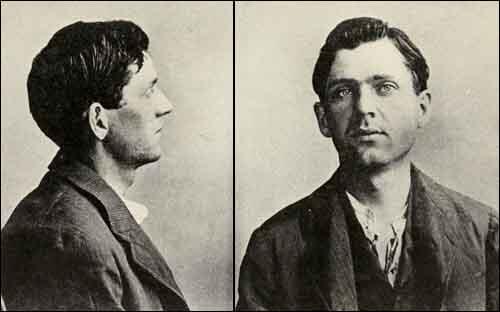
On this day in 1911 Joseph Pulitzer, Hungarian-American publisher, died. Pulitzer, the son of a grain dealer, was born in Budapest, in the Austro-Hungarian Empire in April, 1847. He emigrated to the United States in 1864 and settled in St. Louis. He worked as a mule tender, waiter and hack driver before studying English at the Mercantile Library. In 1868 Pulitzer was recruited by Carl Schurz for his German-language daily, the Westliche Post .
Pulitzer joined the Republican Party and was elected to the Missouri State Assembly. In 1872 he, like many Radical Republicans, supported Horace Greeley against Ulysses S. Grant, the official Republican candidate. Despite the efforts of Pulitzer and Carl Schurz in Missouri, Grant won the presidential election by 286 electoral votes to 66.
In 1872 Pulitzer was able to purchase the St. Louis Post for $3,000. This venture was a success and six years later was able to buy the St. Louis Dispatch for $2,700. He combined the two newspapers and launched crusades against government corruption, lotteries, gambling, and tax fraud. Pulitzer told his readers: "The Post-Dispatch will serve no party but the people; be no organ of Republicanism, but the organ of truth; will follow no causes bit its conclusions; will not support the Administration, but criticize it; will oppose all frauds and shams wherever or whatever they are; will advocate principles and ideas rather than prejudices and partisanship."
By 1883 Pulitzer was a wealthy man and was able to purchase the New York World for $346,000. The newspaper, which had been losing $40,000 a year, was turned into a journal that concentrated on human-interest stories, scandal and sensational material. Pulitzer also promised to use the paper to expose corruption: "We will always fight for progress and reform, never tolerate injustice or corruption, always fight demagogues of all parties, always oppose privileged classes and public plunderers, never lack sympathy with the poor, always remain devoted to the public welfare, never be satisfied with merely printing news, always be drastically independent, never be afraid to attack wrong, whether by predatory plutocracy or predatory poverty."
Pulitzer continued to promote investigative reporting and in 1909 the New York World exposed a fraudulent payment of $40 million by the United States to the French Panama Canal Company. The federal government indicted Pulitzer for criminally libeling President Theodore Roosevelt and the banker John Pierpont Morgan. However, Pulitzer won an important victory for the freedom of the press when the courts dismissed the indictments.
Pulitzer eyesight deteriorated rapidly during his later years and he was forced to retire. His newspaper empire came under the control of his son, Ralph Pulitzer. In 1911 the New York World published a letter from Joseph Pulitzer: "Every issue of the paper presents an opportunity and a duty to say something courageous and true; to rise above the mediocre and conventional; to say something that will command the respect of the intelligent, the educated, the independent part of the community; to rise above fear of partisanship and fear of popular prejudice. I would rather have one article a day of this sort; and these ten or twenty lines might readily represent a whole day's hard work in the way of concentrated, intense thinking and revision, polish of style, weighing of words."
In his will Pulitzer left $2 million for the establishment of a school of journalism at Columbia University. Pulitzer explained: "I am deeply interested in the progress and elevation of journalism, having spent my life in that profession, regarding it as a noble profession and one of unequaled importance for its influence upon the minds and morals of the people. I desire to assist in attracting to this profession young men of character and ability, also to help those already engaged in the profession to acquire the highest moral and intellectual training." He also left a fund that established annual prizes for literature, drama, music and journalism. Since 1922 Pulitzer Prizes have also been awarded to cartoonists.
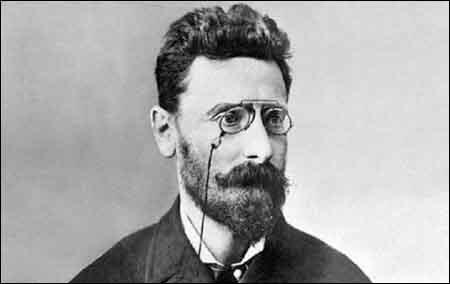
On this day in 1921 the beginning of the second trial of Nicola Sacco and Bartolomeo Vanzetti in Boston, Massachusetts. The main evidence against the men was that they were both carrying a gun when arrested. Some people who saw the crime taking place identified Vanzetti and Sacco as the robbers. Others disagreed and both men had good alibis. Vanzetti was selling fish in Plymouth while Sacco was in Boston with his wife having his photograph taken. The prosecution made a great deal of the fact that all those called to provide evidence to support these alibis were also Italian immigrants.
Vanzetti and Sacco were disadvantaged by not having a full grasp of the English language. Webster Thayer, the judge was clearly prejudiced against anarchists. The previous year, he rebuked a jury for acquitting anarchist Sergie Zuboff of violating the criminal anarchy statute. It was clear from some of the answers Vanzetti and Sacco gave in court that they had misunderstood the question. During the trial the prosecution emphasized the men's radical political beliefs. Vanzetti and Sacco were also accused of unpatriotic behaviour by fleeing to Mexico during the First World War.
In court Nicola Sacco claimed: "I know the sentence will be between two classes, the oppressed class and the rich class, and there will be always collision between one and the other. We fraternize the people with the books, with the literature. You persecute the people, tyrannize them and kill them. We try the education of people always. You try to put a path between us and some other nationality that hates each other. That is why I am here today on this bench, for having been of the oppressed class. Well, you are the oppressor." The trial lasted seven weeks and on 14th July, 1921, both men were found guilty of first degree murder and sentenced to death. The journalist. Heywood Broun, reported that when Judge Thayer passed sentence upon Sacco and Vanzetti, a woman in the courtroom said with terror: "It is death condemning life!"
Bartolomeo Vanzetti commented in court after the sentence was announced: "The jury were hating us because we were against the war, and the jury don't know that it makes any difference between a man that is against the war because he believes that the war is unjust, because he hate no country, because he is a cosmopolitan, and a man that is against the war because he is in favor of the other country that fights against the country in which he is, and therefore a spy, an enemy, and he commits any crime in the country in which he is in behalf of the other country in order to serve the other country. We are not men of that kind. Nobody can say that we are German spies or spies of any kind... I never committed a crime in my life - I have never stolen and I have never killed and I have never spilt blood, and I have fought against crime, and I have fought and I have sacrificed myself even to eliminate the crimes that the law and the church legitimate and sanctify."
Many observers believed that their conviction resulted from prejudice against them as Italian immigrants and because they held radical political beliefs. The case resulted in anti-US demonstrations in several European countries and at one of these in Paris, a bomb exploded killing twenty people.
Fifty years later, on 23rd August, 1977, Michael Dukakis, the Governor of Massachusetts, issued a proclamation, effectively absolving the two men of the crime. "Today is the Nicola Sacco and Bartolomeo Vanzetti Memorial Day. The atmosphere of their trial and appeals were permeated by prejudice against foreigners and hostility toward unorthodox political views. The conduct of many of the officials involved in the case shed serious doubt on their willingness and ability to conduct the prosecution and trial fairly and impartially. Simple decency and compassion, as well as respect for truth and an enduring commitment to our nation's highest ideals, require that the fate of Sacco and Vanzetti be pondered by all who cherish tolerance, justice and human understanding."
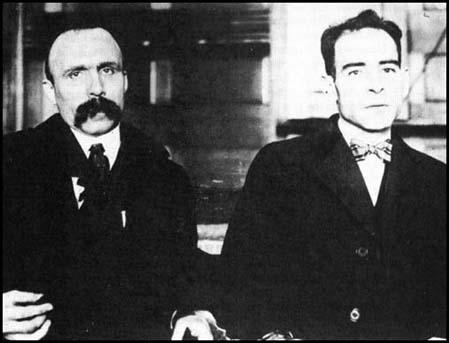
29 October 1933 women's suffrage campaigner Mary Lease died.
Mary Clyens, the daughter of Irish immigrants, was born on 11th September 1850. Both her father and older brother joined the Union Army during the American Civil War. Her brother was killed and her father died in Andersonville Prison.
In 1870 she moved to Kansas to teach at a Catholic mission school. Soon afterwards she married Charles Lease, a local shop owner. His business was destroyed in the financial crisis of 1873 and the couple moved to Texas.
Mary Lease became involved in politics and was an active supporter of prohibition and women's suffrage. She joined the Women's Temperance Union, the Farmers' Alliance and the Populist Party. She obtained a national reputation as an outstanding orator and between 1890 and 1896 she toured the country making speeches.
In the 1896 presidential election the leaders of the Populist Party entered into talks with William J. Bryan, the proposed Democratic Party candidate. They thought they had an agreement that Watson would become Bryan's running mate. After giving their support to Bryan he announced that Arthur Sewall, a conservative politician with a record of hostility towards trade unions, would be his vice presidential choice.
This created a split in the Populist Party, some refused to support Bryan whereas Lease reluctantly campaigned for him. However, in her campaign speeches she declared her support for socialism and rejected many of of Bryan's policies.
The defeat of William J. Bryan severely damaged the Populist Party. While Populists continued to hold power in a few Western states, the party ceased to be a factor in national politics.
Lease divorced her husband and moved to New York City. She joined the Socialist Party and campaigned for Eugene V. Debs when he ran for president in 1908.
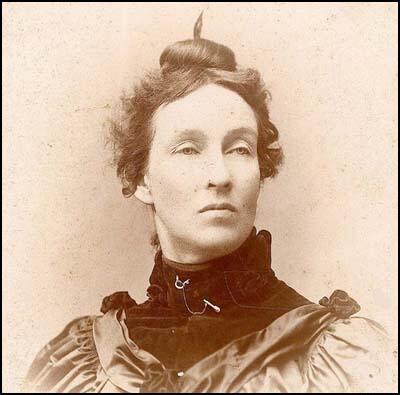
On this day in 1961 Agnes Harben died in the Jersey parish of St. Saviour.
Agnes Bostock, he fifth of eleven siblings, was born on 15th September 1879, at 7 North Street, Horsham, Sussex. Her parents were Dr. Edward Ingram Bostock (1842-1946) and Sarah Baker Bostock (1845-1920). Her father eventually became chairman of the Horsham Urban District Council.
In 1899 Agnes married Henry Devenish Harben. He was the grandson of Henry Harben (1823-1911), the chairman of the Prudential Insurance Company. He was educated at Eton College and Magdalen College. After leaving the University of Oxford, he trained as a barrister.
A member of the Conservative Party, he was a candidate in the 1900 General Election. However, he gradually moved to the left and he stood unsuccessfully as a Liberal Party candidate in the 1906 General Election.
In 1907, several left-wing intellectuals, including Henry Harbin, Henry Nevinson, Laurence Housman, Charles Corbett, George Lansbury, Henry Brailsford, C. E. M. Joad, Israel Zangwill, Hugh Franklin, Gerald Gould, Charles Mansell-Moullin, and 30 other men formed the Men's League For Women's Suffrage "with the object of bringing to bear upon the movement the electoral power of men. To obtain for women the vote on the same terms as those on which it is now, or may in the future, be granted to men."
Agnes Harben joined the Women's Social and Political Union (WSPU). Although she never took part in militant activities herself she provided a home for people like Annie Kenney and Rachel Barrett and many other suffragettes, released from prison to aid recovery from hunger strike and force-feeding.
By 1911 it became clear that Herbert Asquith and his Liberal Party were unwilling to support legislation. At its annual party conference in January 1912, the Labour Party passed a resolution committing itself to supporting women's suffrage. This was reflected in the fact that all Labour MPs voted for the measure at a debate in the House of Commons on 28th March. Soon afterwards Henry N. Brailsford and Kathleen Courtney, entered negotiations with the Labour Party as representatives of NUWSS.
In April 1912, the NUWSS announced that it intended to support Labour Party candidates in parliamentary by-elections. Emily Davies, a member of the Conservative Party, and Margery Corbett-Ashby, an active supporter of the Liberal Party, resigned from the NUWSS over this decision. However, others like Henry Harben, left the Liberal Party in protest against the government's attitude to the suffrage question.
Agnes and Henry Harben now joined the Labour Party and donated money to the National Union of Women's Suffrage Societies Election Fighting Fund (EFF). This money was used to support Labour candidates in by-elections. During this period Harben became friends with Muriel de la Warr, who was also helping to fund the EFF. With her encouragement he joined the board of The Daily Herald. On 14th February, 1913 Harben wrote to Emmeline Pankhurst about his financial support of the newspaper: "It would have been a disaster if the only daily paper which has furiously championed militancy in both the women's and the labour movements, had been allowed to die, and I was at work till after eleven last night to advert this." Sylvia Pankhurst claims that this money was used to acquire the Victoria House Printing Press.
In June 1913 Agnes Harben and Henry Harben were delegates to the International Women's Suffrage Alliance in Budapest. He represented the Men's League For Women's Suffrage and she the Fabian Women's Group. Emmeline Pethick-Lawrence and Chrystal Macmillan, formed the Women's International League of Great Britain. Other women who joined this group included Sylvia Pankhurst, Mary Sheepshanks, Charlotte Despard, Helen Crawfurd, Ethel Snowden, Ellen Wilkinson, Margery Corbett-Ashby, Selina Cooper, Helena Swanwick and Olive Schreiner.
In 1914 Henry Harben and Norah Smyth agreed to finance the establishment of the Women's Hall at 400 Old Ford Road in Bow. It was large enough to hold meetings of 350 people. It became the headquarters of the East London Federation of Suffragettes (ELFS). It became a social centre run largely by and for local working-class women. It housed a ‘Cost Price Restaurant' where people could get a hot meal at a very low price and free milk for their children.
C. E. M. Joad met Henry Harben during this period: "Looking back, I can date the change from a meal which I had with Mr. H. D. Harben in the autumn of 1914 and the homily which it provoked. H. D. Harben was a Socialist; he was rich, he was a gentleman, and he had a large place in the country. He was also an ardent suffragist. Suffragettes, let out of prison under the Cat and Mouse Act, used to go to Newlands to recuperate, before returning to prison for a fresh bout of torture. When the county called, as the county still did, it was embarrassed to find haggard-looking young women in dressing-gowns and djibbahs reclining on sofas in the Newlands drawing-room talking unashamedly about their prison experiences. This social clash of county and criminals at Newlands was an early example of the mixing of different social strata which the war was soon to make a familiar event in national life. At that time it was considered startling enough, and it required all the tact of Harben and his socially very competent wife to oil the wheels of tea-table intercourse, and to fill the embarrassed pauses which punctuated any attempt at conversation."
On 6th February 1914 a group of supporters of women's suffrage, who were disillusioned by the lack of success of the National Union of Women's Suffrage Societies and disapproved of the arson campaign of the Women Social & Political Union, decided to form the United Suffragists. This included Agnes and Henry Harben. Other members included Henry Harben, Emmeline Pethick-Lawrence, Frederick Pethick-Lawrence, Evelyn Sharp, Mary Neal, Henry Nevinson, Margaret Nevinson, Hertha Ayrton, Barbara Ayrton Gould, Gerald Gould, Israel Zangwill, Edith Zangwill, Lena Ashwell, Louisa Garrett Anderson, Eveline Haverfield, Maud Arncliffe Sennett, John Scurr, Julia Scurr and Laurence Housman.
During the First World War Harben joined forces with Sylvia Pankhurst and George Lansbury to establish the League of Rights for Soldiers' and Sailors' Wives and Relatives. Pankhurst later recorded: "When I read in the newspapers that Mrs. Pankhurst and Christabel were returning to England for a recruiting campaign, I wept. To me this seemed a tragic betrayal of the great movement to bring the mother-half of the race into the councils of the nation… We set up a League of Rights for Soldiers' and Sailors' Wives and Relatives to strive for better pensions and allowances." Harben also purchased the Hotel Majestic in Paris to turn it into an English hospital. He also donated money to the East London Federation of Suffragettes (ELF).
A member of the Labour Party he stood and was defeated in 1920 for the Woodbridge constituency in Suffolk. A close friend of Sylvia Pankhurst he helped to pay for her son's education at the London School of Economics.
